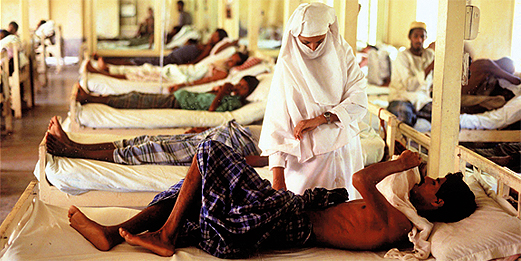
Our field studies aim to have a practical impact on malaria control and treatment.
With Peter Kremsner at the University of Tübingen, Germany, and collaborators in Gabon, we have carried out multiple studies examining different antimalarial drug treatments and routes of administration, which have informed policy and practice. We are continuing our work in Gabon, where we aim to minimise the burden of disease through a multifaceted approach encompassing policy support as well as clinical studies to test new classes of antimalarial drugs and use of new diagnostic tools.
We have also had a longstanding interest in the pathophysiological consequences of malaria parasite infection, including fluid balance and lactic acidosis. Our studies in Africa have found no evidence that severe malaria is associated with excessive fluid loss, arguing against rapid rehydration in children with severe malaria. We are continuing to study the causes of lactic acidosis and possible ways to address it.
Key publications
Antimalarial treatments
Krishna S et al. Bioavailability and preliminary clinical efficacy of intrarectal artesunate in Ghanaian children with moderate malaria. Antimicrob Agents Chemother. 2001;45(2):509–16.
Gomes MF et al. Pre-referral rectal artesunate to prevent death and disability in severe malaria: a placebo-controlled trial. Lancet. 2009;373(9663):557–66.
Nealon C et al. Intramuscular bioavailability and clinical efficacy of artesunate in Gabonese children with severe malaria. Antimicrob Agents Chemother. 2002;46(12):3933–9.
Adjuik M et al. Amodiaquine-artesunate versus amodiaquine for uncomplicated Plasmodium falciparum malaria in African children: a randomised, multicentre trial. Lancet. 2002;359(9315):1365–72.
Kremsner PG et al. A simplified intravenous artesunate regimen for severe malaria. J Infect Dis. 2012;205(2):312–9.
Fluid balance
Planche T et al. Assessment of volume depletion in children with malaria. PLoS Med. 2004;1(1):e18.
Jarvis JN et al. Lactic acidosis in Gabonese children with severe malaria is unrelated to dehydration. Clin Infect Dis. 2006;42(12):1719–25.